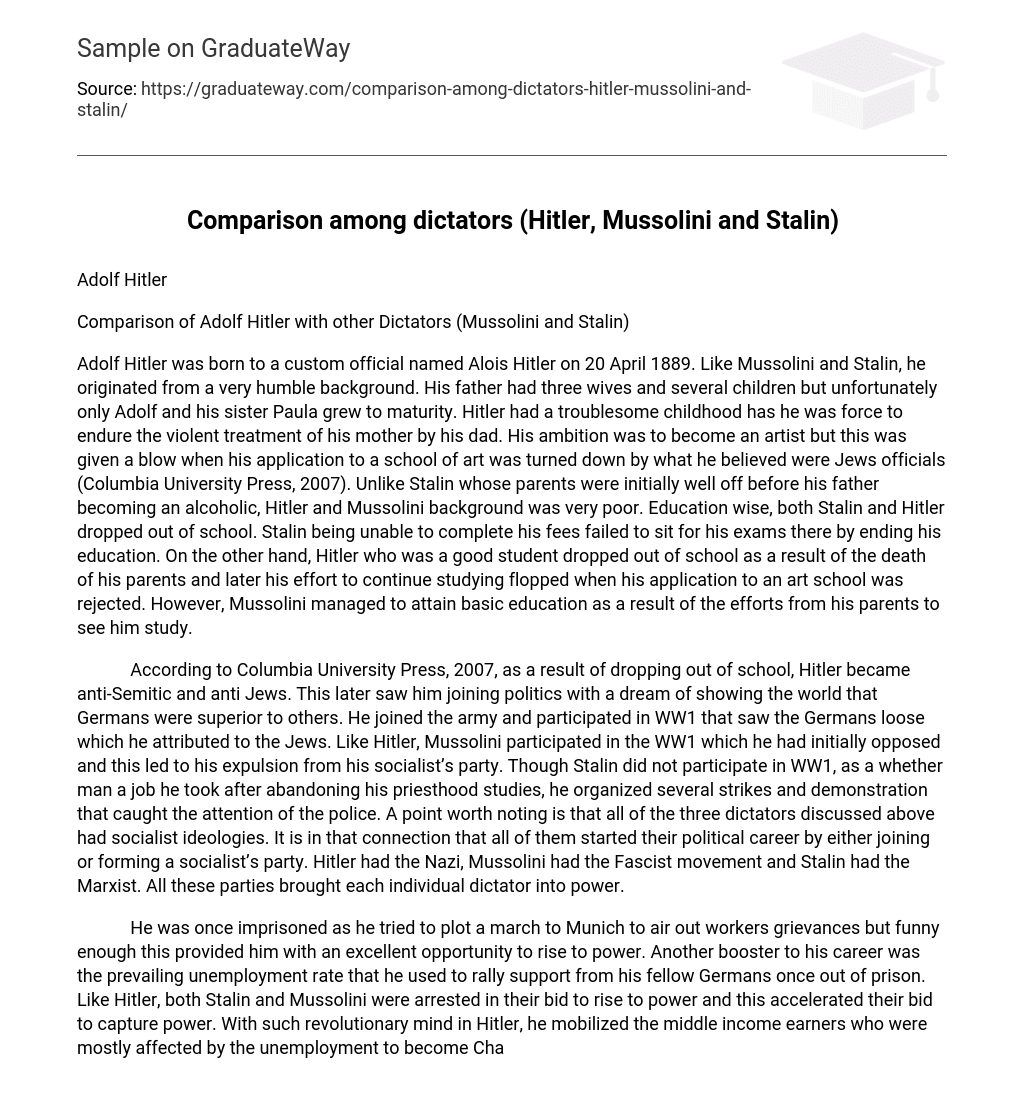Adolf Hitler
Comparison of Adolf Hitler with Other Dictators (Mussolini and Stalin)
Adolf Hitler was born on 20 April 1889 to a customs official named Alois Hitler. Like Mussolini and Stalin, he came from a humble background. His father had three wives and several children, but unfortunately only Adolf and his sister Paula survived to adulthood. Hitler had a troubled childhood as he was forced to endure the violent treatment of his mother by his father. His ambition was to become an artist, but this dream was shattered when his application to an art school was rejected by what he believed were Jewish officials (Columbia University Press, 2007).
Unlike Stalin, whose parents were initially well-off before his father became an alcoholic, Hitler and Mussolini came from very poor backgrounds. Both Stalin and Hitler dropped out of school; Stalin failed to complete his fees and therefore could not sit for exams, effectively ending his education. Meanwhile, despite being a good student, Hitler dropped out of school due to the deaths of both parents; later on, his efforts at continuing education were thwarted when he failed in his application to art school. However, Mussolini managed to attain basic education thanks in part due to the efforts of his parents.
According to Columbia University Press in 2007, Hitler became anti-Semitic and anti-Jewish as a result of dropping out of school. This later led him to join politics with the dream of proving that Germans were superior to others. He joined the army and participated in WW1, which saw Germany lose, and he attributed this loss to the Jews.
Mussolini also participated in WW1, which he had initially opposed, leading to his expulsion from his socialist party. Stalin did not participate in WW1 but worked as a weatherman after abandoning his priesthood studies. He organized several strikes and demonstrations that caught the attention of the police.
It is worth noting that all three dictators discussed above had socialist ideologies. They started their political careers by either joining or forming socialist parties: Hitler with the Nazi Party, Mussolini with the Fascist movement, and Stalin with Marxism. These parties brought each dictator into power.
He was once imprisoned for attempting to organize a march to Munich to voice workers’ grievances. Ironically, this imprisonment provided him with an excellent opportunity to rise to power. Additionally, the prevailing unemployment rate in Germany allowed him to rally support from his fellow Germans upon his release from prison. Similar to Hitler, Stalin and Mussolini were also arrested in their efforts to gain power, which ultimately accelerated their rise to power.
With his revolutionary mindset, Hitler mobilized middle-income earners who were most affected by unemployment and became Chancellor of Germany in 1933. He fulfilled his promises by creating employment opportunities and decreasing the unemployment rate from seven million down to one million.
Mussolini similarly plotted against the government and eventually gained inclusion into government before ruling Italy.
As rulers, all of them became serious dictators, forming a single government state without opposition. The government controlled and allocated all available resources in their respective countries. At one time, the three dictators forged a friendship with each other due to their similar ideologies. While Mussolini has been viewed by many as a dictator who did not accomplish his ideologies, both Hitler and Stalin made theirs a reality before their death.
In conclusion, all three dictators ruled without mercy and disregarded fundamental human rights, which contributed to their unpopularity and eventual removal from power. Hitler committed suicide, while Mussolini was executed.
References
Columbia University Press (2007) published Hitler in Power.” To access this resource, visit The Columbia Electronic Encyclopedia at http://www.columbiaelectronicencyclopedia.com. Retrieved on January 30, 2009.





